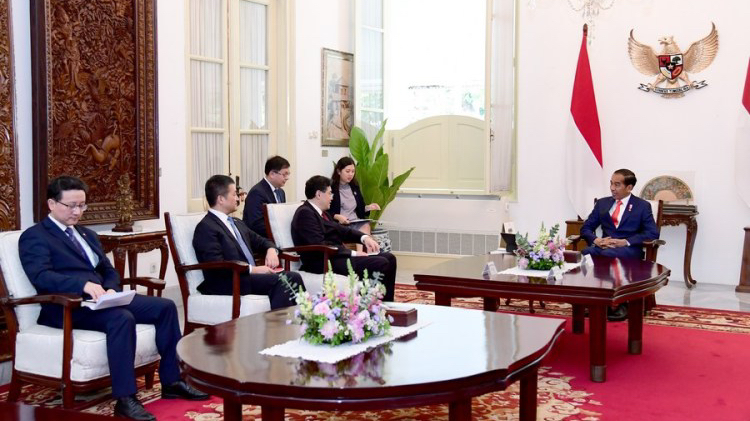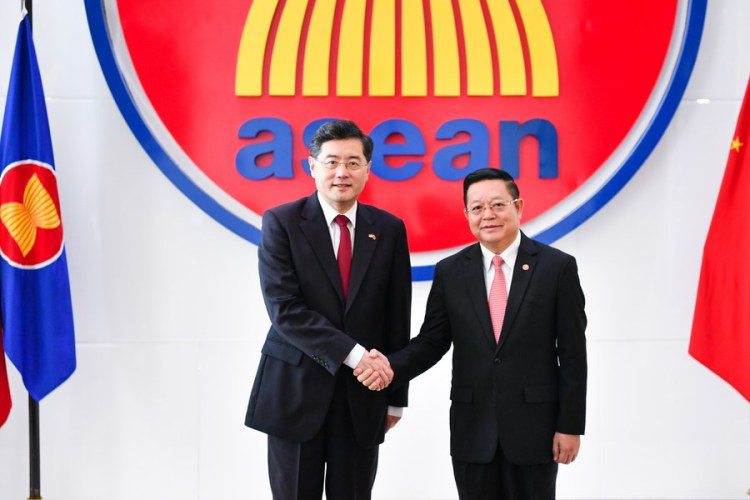
Indonesian President Joko Widodo meets with visiting Chinese Foreign Minister Qin Gang in Jakarta, Indonesia, February 22, 2023. /Xinhua
Indonesian President Joko Widodo meets with visiting Chinese Foreign Minister Qin Gang in Jakarta, Indonesia, February 22, 2023. /Xinhua
Editor's note: Yu Hong is Senior Research Fellow of the East Asian Institute, National University of Singapore. The article reflects the author's opinions and not necessarily the views of CGTN.
Chinese Foreign Minister Qin Gang visited Jakarta from February 21 to 23, 2023, which was his first visit to Indonesia and Southeast Asia. Qin's visit reflects the significance of Indonesia and the Association of Southeast Asian Nations (ASEAN) for China's foreign policy in general and its neighborhood diplomacy in particular.
China sees Indonesia as both an influential country in the ASEAN and a rising power itself with strategic significance in the emerging multipolar world. In October 2013, Chinese President Xi Jinping announced proposals for the 21st Century Maritime Silk Road in Indonesia, which forms the maritime component of the Belt and Road Initiative (BRI).
This year marks the 10th anniversary of the establishment of comprehensive strategic partnership between China and Indonesia. A main item on the agenda of China's Foreign Minister's visit was to co-chair the fourth Joint Commission for Bilateral Cooperation (JCBC) between the two countries, with Indonesian Minister for Foreign Affairs Retno Marsudi.
The JCBC focuses on strengthening bilateral comprehensive strategic partnerships on infrastructure and connectivity, industrial cooperation, maritime affairs, trade and investment, and people-to-people exchanges. Both countries also seek to expand cooperation on the digital economy and green development.
Moreover, both Indonesia and the ASEAN want to expedite negotiation on the Code of Conduct (COC) in the South China Sea, which was overshadowed by the COVID-19 pandemic. As the rotating chair of ASEAN, Indonesia seeks to work with China to produce an effective and actionable COC as soon as possible in order to ensure long-term peace and stability in the South China Sea.
Another major item on Qin's agenda was a visit to the ASEAN Secretariat. China values the importance of ASEAN maintaining the strategic autonomy and centrality of ASEAN as a grouping in the region by avoiding taking sides in the major power rivalry. Qin also met the ASEAN Secretary-General Kao Kim Hourn and members of the Committee of Permanent Representatives to ASEAN.
Qin Gang's visit was intended to speed up the implementation of the consensus reached between Chinese President Xi Jinping and Indonesian President Joko Widodo during their last summit in Bali, Indonesia, last year.

Visiting Chinese Foreign Minister Qin Gang (L) shakes hands with ASEAN Secretary-General Kao Kim Hourn during their meeting in Jakarta, Indonesia, on February 22, 2023. /Xinhua
Visiting Chinese Foreign Minister Qin Gang (L) shakes hands with ASEAN Secretary-General Kao Kim Hourn during their meeting in Jakarta, Indonesia, on February 22, 2023. /Xinhua
In 2022, the bilateral trade volume between China and Indonesia totaled $149 billion. Furthermore, trade between China and Indonesia is becoming more balanced, with a substantial reduction of the trade deficit on the Indonesia side.
Mineral and agricultural products are the two most important exports from Indonesia to China. China is also committed to increasing imports of commodities, agricultural and aquacultural products from Indonesia.
On the investment front, China has now become the second largest foreign investor in Indonesia. Chinese companies have been very active in expanding their business in Indonesia, one of the fast-growing economies in the Asia Pacific region. The Chinese construction firms are building many large-scale infrastructure projects in the country under the BRI framework, including the Jakarta-Bandung High-Speed Railway.
Indonesia is rich in mineral resources, but its weak infrastructure, limited technological capabilities, and insufficient talents are factors that hinder the development of its mineral industries, such as nickel ore. However, the rapid development of Chinese-invested industrial parks in Indonesia has alleviated such pressure and created employment for around 100,000 local workers and led to emergence of associated service industries, thereby boosting local economic and social development.
As China accelerates its economic transformation and industrial upgrading, some of its labor-intensive manufacturing industries will be transferred to Indonesia and other ASEAN countries with relatively low production costs. This is expected to increase Chinese investment in ASEAN and provide opportunities for ASEAN countries to develop their industries.
In addition, the implementation of Regional Comprehensive Economic Partnership, a regional free trade agreement, will lead to reduction of non-tariff barriers and introduction of more trade and investment facilitation measures, as well as improvement of intra-regional connectivity and transportation infrastructure. These factors will further encourage Chinese enterprises to expand their direct investment in Indonesia in the coming years.
Chinese tourists have played an important role in Indonesia's tourism industry during the pre-pandemic era with roughly two million Chinese travelers visiting the country annually. As China has reopened and the gradually increased bilateral direct flights between China and Indonesia, more Chinese tourists are expected to be attracted to visit Indonesian places of interest, boosting the country's economic performance.
(If you want to contribute and have specific expertise, please contact us at opinions@cgtn.com. Follow @thouse_opinions on Twitter to discover the latest commentaries in the CGTN Opinion Section.